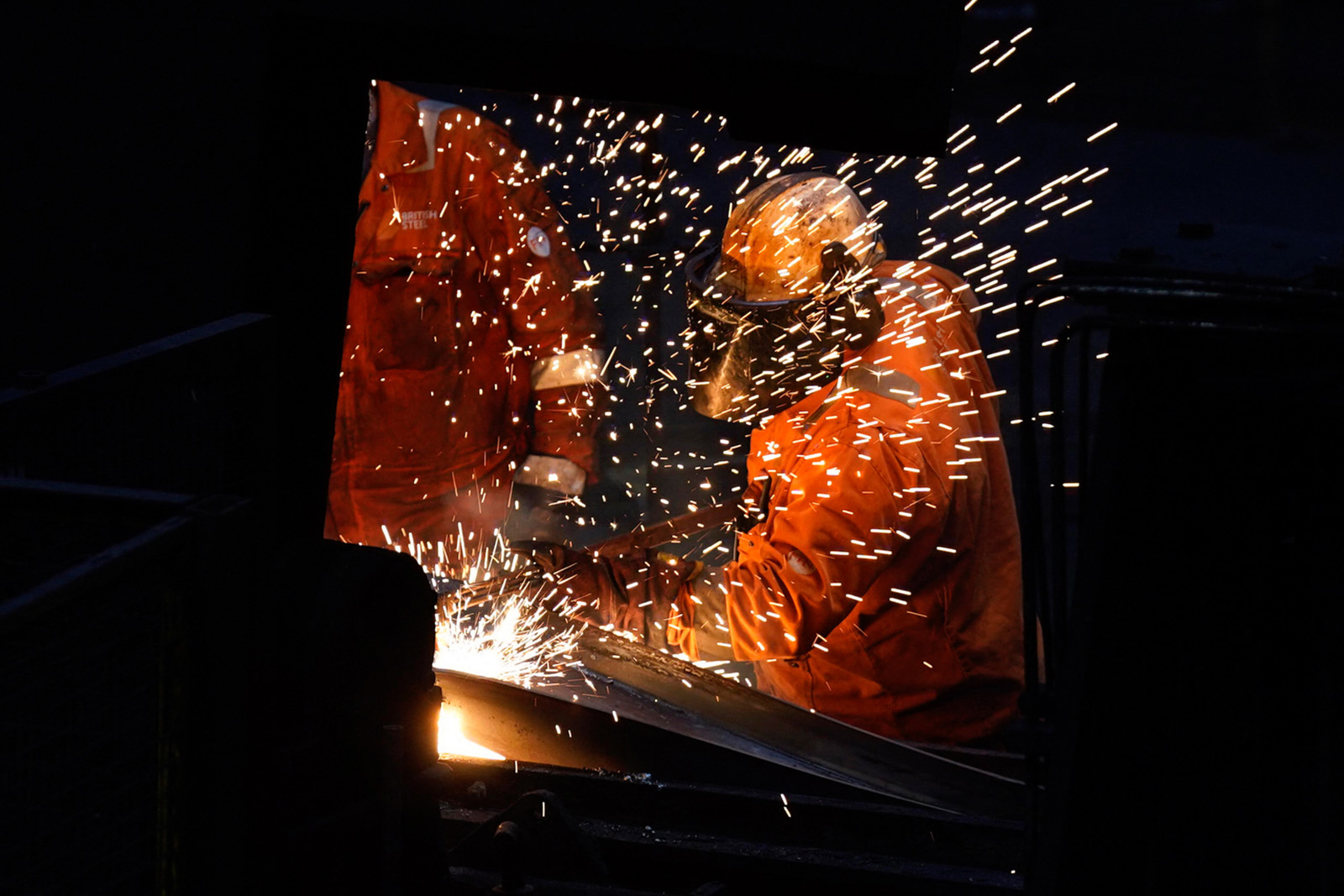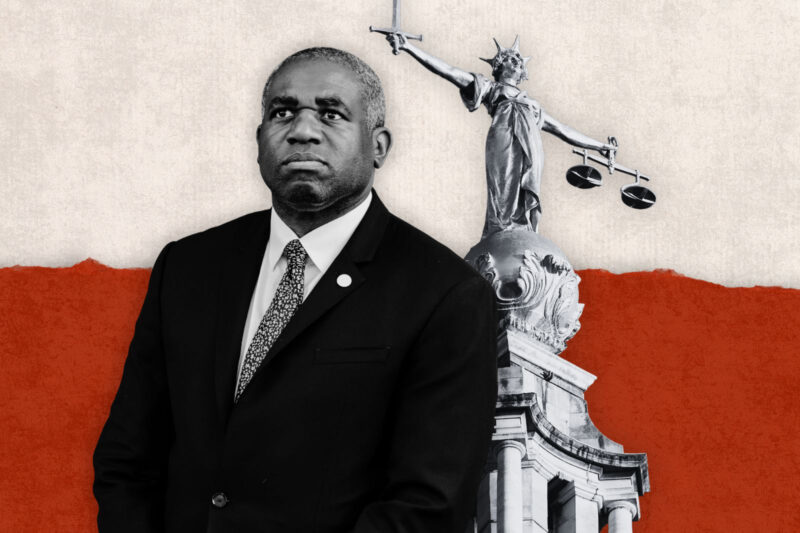Reform is making serious inroads within the union movement. Labour needs to stop it
For too long the left has taken the support of rank and file members for granted

On Saturday 12 April, parliament was recalled for the first time on a weekend since the Falklands war in 1982. On the agenda: emergency legislation to take control of Chinese-owned British Steel and prevent the company from shutting down its two remaining blast furnaces in Scunthorpe, Lincolnshire. If they ceased to operate, the UK would have become the only G7 nation unable to produce its own steel and thousands of workers would have been thrown onto the scrapheap.
In the House of Commons, MP for Boston and Skegness and deputy leader of Reform UK Richard Tice sported a Save Our Steel trade union badge. Days earlier, he and party leader Nigel Farage posed at Scunthorpe steelworks clutching union pamphlets and calling for the renationalisation of British Steel.
While Reform usually pushes the rightwing libertarian ideals of a smaller state and unfettered private enterprise, both men understand the political implications of the threat to British Steel and the opportunities it presents. The party knows that its appeal now reaches far beyond disillusioned Conservatives and that it is making serious inroads into old Labour heartlands. With the Lincolnshire mayoral election looming, Reform hopes to kickstart a winning streak in ballots both local and national in the coming years.
Trade unions are not a monolith. While internal structures are often dominated by leftwing progressives, rank and file membership comes from across the political spectrum. In 2019, for instance, 39% of Unite members voted Tory, according to a YouGov poll. The left has, however, long taken the support of the shop floor for granted, failing to directly engage with workers and ensure that they are adequately represented in organisations that purport to speak on their behalf.
Such an approach leaves the door wide open for populist figures such as Tice and Farage — and history shows they may be welcomed in. In 1955, bus drivers in West Bromwich took strike action over the employment of an Indian man. And, in 1968, when Tory MP Enoch Powell was sacked from the Conservative shadow cabinet for his infamous “rivers of blood” speech, thousands of dockers and meat porters marched in his defence.
In seats with large white working-class populations, Reform is now drawing between 10% and 15% of former Labour voters, according to a recent poll commissioned by the campaign group Hope Not Hate. From Doncaster to Durham, the party is poised to take council seats in a number of constituencies once regarded as Labour strongholds.
Just as Donald Trump won over workers in the US rust belt with promises of economic revival, Farage is now pledging to “reindustrialise Britain”. Regardless of the practicality of this pledge, it’s a message that resonates with communities battered by globalisation, forgotten by Westminster and desperate for a future.
As for Reform supporters, the majority endorse a number of economic policies that are broadly viewed as leftwing. According to YouGov polling, 87% back nationalising water companies, 77% want Royal Mail back under public ownership and 75% support renationalising energy.
Following the emergency legislation passed in the Commons on Saturday, it is likely that the government will now move to nationalise British Steel. The Labour government will claim it is saving jobs and safeguarding an industry. Reform will argue that it forced Labour’s hand.

In Port Talbot, all that self-congratulation will ring hollow. The Indian conglomerate Tata’s 2024 closure of its blast furnaces cost the Welsh town 2,500 jobs. Many in the local community describe the move as industrial vandalism.
Luke Fletcher, Senedd Cymru member for South Wales West, recently visited Port Talbot and says the sense of betrayal among local people is palpable. Fletcher’s party, the Welsh nationalist Plaid Cymru, says it was mocked by Welsh Labour for calling for nationalisation of the town’s steel plant. “Why was nationalisation good enough for England but not for Wales?” he asks.
Plaid Cymru is picking up support from disillusioned steelworkers, but Reform could overtake Labour in the Senedd Cymru elections next year. A senior trade unionist recently told me several shop stewards in Port Talbot were backing Reform. There are even rumours that one may stand as a Reform candidate in the 2026 Senedd elections.
It’s a jarring contradiction. Reform MPs recently voted against the employment rights bill that would ban zero-hours contracts and fire-and-rehire practices, measures that are widely supported by its voters.
Farage once claimed that he was the only politician in Britain keeping the legacy of Margaret Thatcher alive. It was Thatcher, of course, who presided over the privatisation of key industries such as steel and coal, and a dramatic erosion of union power. From the pit villages of Durham to the South Wales coalfields, many still live with the consequences of her actions, but a significant number are apparently willing to give her heir apparent a chance, placing Reform consistently at the top of voter polls.
Economic insecurity, distrust of traditional parties and a steady drip of anti-immigration rhetoric — on TV, online, and increasingly on TikTok — are driving that rise. One union organiser has told me that some members complained to him that their union subs were too expensive, compared to their Reform UK memberships. Another, in the East Midlands, estimates half of the young men he represents now back the party.
While some insist that Reform voters are irredeemable racists who can’t be won over, I disagree. The party’s growing base is as broad a coalition of interests as the one that put Boris Johnson into power in 2019.
Hope Not Hate’s poll found a diverse range of views among Reform supporters. Many hold traditionally leftwing positions on the economy and a sizable group are pretty positive about the benefits of migration and multiculturalism. What unites them all is a distrust of the establishment, a sense that life is getting harder and a desire for change.
The left shares that concern but too often spends its time preaching to the choir. Labour desperately needs to directly engage with and win over disenchanted voters. That requires a serious grassroots strategy — one that acknowledges that people are right to be angry and focuses on the right targets: successive governments that have sat on their hands while industry collapsed, exploitative employers that force people to work harder for ever-diminishing rewards, landlords that charge tenants exorbitant rents for substandard properties and utility companies that profiteer at our expense.
When I was covering the 2022–23 strike wave, I spoke to hundreds of trade unionists: sharp, compassionate individuals who know how to build coalitions, listen, persuade, and win. If there’s any hope of challenging the creeping rise of the far right, they are the people — grounded in workplaces and trusted in their communities — who need to be at the heart of it.
 Newsletter
Newsletter













